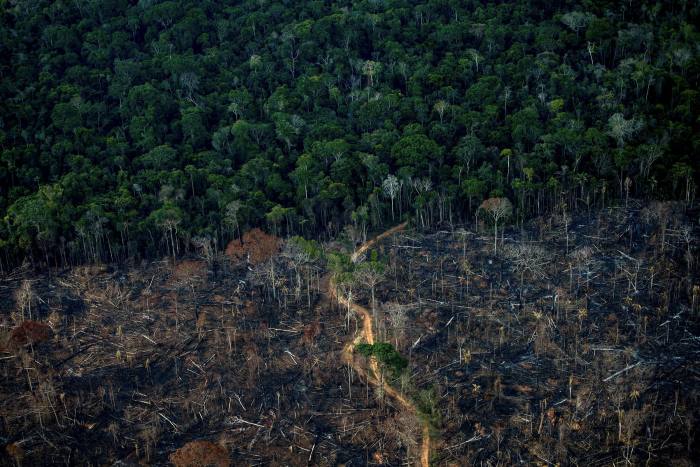The search for climate-savvy board directors
This article is an on-site version of our Moral Money newsletter. Sign up here to get the newsletter sent straight to your inbox.
Visit our Moral Money hub for all the latest ESG news, opinion and analysis from around the FT
As an eventful year draws to a close, we’ve been reflecting on some of the hottest topics of 2021 in sustainable business and finance. Among them is the “divestment versus engagement” debate — which gained another interesting case study this week, as UBS Asset Management said it would exclude ExxonMobil and four other energy groups from its range of “climate aware” funds.
UBS, like many money managers, has argued that by holding big oil companies in these funds, it can pressure them to accelerate their green transition. Three years ago it launched a lobbying drive aimed at 49 companies it had identified as laggards in the energy transition. Most had improved their showing, said Francis Condon, UBS Asset Management’s head of thematic engagement. “However, where we have not seen tangible progress, we are taking action.”
With dozens of fossil fuel producers still held in its sustainable funds, UBS has hardly abandoned its focus on engaging with management at fossil fuel companies. Yet its move illustrates the growing momentum of the fossil fuel divestment drive — even as some question whether it is doing anything to raise the cost of capital for polluting companies. A recent report by the Global Fossil Fuel Divestment Commitments Database counted nearly 1,500 institutions now committed to some form of fossil fuel divestment, with $39.2tn under management between them. That’s up from just $52bn in 2014, the report says.
The debate around investor stewardship is set to stay high on the sustainable business agenda in 2022. For a sense of what else the new year may have in store, look out for our special edition on January 5.
Meanwhile, we’ll be taking a two-week hiatus, and wish all our readers a safe and restful winter break. — Simon Mundy
Companies face an ESG skills gap
Three-quarters of board directors now consider climate change a central issue for their companies’ long-term success, according to a new global study by Insead business school and headhunter Heidrick & Struggles. Yet only half said that the subject was properly integrated into their business’s investment decisions, and the majority said their board still needed to increase its climate knowledge.
“Many directors are overwhelmed by the scale and complexity of their environmental, social, and governance (ESG) responsibilities,” the report warned. It pointed to a situation that is becoming increasingly problematic for many boards: people with serious climate expertise typically lack the business experience that is traditionally required of a company director.
The survey results sit awkwardly with the ambitious climate pledges made by big global companies, more than 200 of which have now committed to reaching net zero emissions by 2040.
It’s not just at board level that companies are facing a shortage of candidates with strong sustainability credentials, recruiters told Moral Money.
“ESG talent is in high demand,” said Ellen Weinreb, chief executive of the Weinreb Group, a sustainability-focused recruiter. Workers in this field have more job options and negotiating power than ever before, she said.
PwC signalled the striking demand for talent in this space when it announced it would invest $12bn to create 100,000 ESG-focused roles over the next five years.

Others are taking a hands-on approach to the skills gap. AllianceBernstein has developed a course on climate-related risks with Columbia University for its analysts and fund managers. Accenture is providing ESG training for its 600,000 employees through online interactive video content catered to each department.
The demand for these skills has already started to influence the business school agenda, with MBA programmes integrating ESG topics into core courses. But students fresh out of business school, however sustainability-smart, will do little to address the lack of climate-savvy board candidates.
“We will eventually all have to have a sustainability expert,” said one respondent to the Insead/Heidrick & Struggles survey. For companies under pressure to follow through on lofty climate pledges, “eventually” may not be good enough. (Kristen Talman)
As Aspiration grows, questions raised about trees and customers

The business of planting trees has enjoyed time in the sun this year. Major banks like Lloyds and JPMorgan have rolled out partnerships with conservation organisations, and some mutual fund companies are also coughing up cash for trees when shareholders switch to e-delivery for documents.
But few in finance have embraced tree planting as aggressively as Aspiration, a California fintech that offers online savings products. Aspiration customers can fund a sapling when they round-up their purchases to the nearest dollar and are eligible for rewards when they reach certain tree-planting milestones. The business also has a growing enterprise division that has forged corporate partnerships with the likes of the Los Angeles Clippers basketball team and subsidiaries of South Korea’s Hanwha Group.
Aspiration’s sunny story has attracted Wall Street’s photosynthesis machine. The company, recently valued at $2.3bn, is poised to merge with a blank-cheque company in early 2022. Last week, Aspiration secured a $315m investment from Oaktree Capital and Steve Ballmer, Microsoft’s former chief executive.
Climate Capital

Where climate change meets business, markets and politics. Explore the FT’s coverage here.
Are you curious about the FT’s environmental sustainability commitments? Find out more about our science-based targets here
But some have raised questions about Aspiration. New York University professor Scott Galloway noted that Aspiration touts 5m members, yet in a footnote in investor materials Aspiration says that its actual customers total 361,000. (The company defines members as anyone who has signed their terms and conditions, even if they have not yet created an account.)
“It’s apples and oranges. I think we, and pretty much every fintech out there, talk about our members as those who have joined our community and the customers who are using one product or another is a different measurement,” Andrei Cherny, Aspiration chief executive and co-founder, told Moral Money.
ProPublica, the investigative journalism website, pointed out that Aspiration’s claim to have planted 35m trees includes trees that have been paid for, but are not yet in the ground. The company has since revised its claim to state that it has planted 16m trees.
Aspiration is a B Corp — a business certified by the non-profit group B Lab for achieving high environmental and social standards. Since 2016, Aspiration has been a B Corp “best for the world” honoree seven times over. But following the concerns raised by Galloway and ProPublica, B Lab said it was reviewing these allegations as part of a complaints assessment process. B Lab declined to comment further.
Companies offering sustainable products have attracted a level of scrutiny that other sectors, such as high-flying tech start-ups, have managed to evade. Often, this scrutiny is for good reason. But getting to the real root of the problem will probably require widely adopted global standards for carbon offsets and other types of green accounting.
“I welcome those [standards] because it’ll make clear who’s doing this the right way and who’s not,” Cherny said. (Emily Goldberg and Patrick Temple-West)
Tips from Tamami
Nikkei’s Tamami Shimizuishi helps you stay up to date on stories you may have missed from the eastern hemisphere.
This month’s typhoon in the Philippines has highlighted the severe dangers posed by climate change in south-east Asia. But even as the climate threats mount, the region is set to increase carbon emissions from new coal-fired power plants.
The Philippines, Vietnam, and Indonesia have a combined coal pipeline of nearly 45 gigawatts of coal-fired capacity by 2030, according to a new report by the Institute of Energy Economics and Financial Analysis.
Compared with the Philippines’ entire power capacity — which is currently around 26 gigawatts, 45 gigawatts is “huge,” said Haneea Isaad, research associate at IEEFA. Isaad argued that the additional coal capacity could pose a risk to the success of the Asian Development Bank’s early retirement scheme for coal-fired plants.
Last month, the ADB launched a programme called Energy Transition Mechanism (ETM), which plans to buy coal-fired power plants in the region and retire them within 15 years, reducing their usual lifespan by more than half.
The ambitious scheme is aiming to wind down about 50 per cent of the coal plants in the three countries through public-private partnerships. If successful, the programme could cut 200m tonnes of carbon emissions per year — the equivalent of taking 61m cars off the road, the ADB said.
“The scale of coal pipelines in south-east Asia illustrates the reality that coal lock-in will only get worse if business continues as usual,” Isaad said. She urged policymakers to put adequate measures in place to make the ETM scheme work properly.
The loss of either power capacity or jobs caused by coal plant closures should be picked up elsewhere, said Grant Hauber, energy finance analyst at IEEFA, urging investors in the west to play a role in making the green shift a “just transition”.
“If an ETM is missing this balance, a prospective investor should insist on this approach,” Hauber said, adding that it is “not only good for the economy into which the money is going, a sound ETM design actually serves to mitigate the overall risk to the investor”.
Smart read
-
London-based fund manager Schroders will pay £358m to acquire a 75 per cent stake in Greencoat Capital, one of Europe’s largest renewable infrastructure managers. The move marks the latest example of dealmaking in the asset management industry and underscores greater demand for renewable energy assets.
